Read the following and answer the following questions from Q 112 (i) to 112 (v).
Metallic character: The ability of an atom to donate electrons and form positive ion (cation) is known as electropositivity or metallic character. Down the group, metallic character increases due to increase in atomic size and across the period, from left to right electro-positivity decreases due to decrease in atomic size.
Non-metallic character: The ability of an atom to accept electrons to form a negative ion (anion) is called non-metallic character or electronegativity. The elements having high electronegativity have a higher tendency to gain electrons and form anion. Down the group, electronegativity decreases due to increase in atomic size and across the period, from left to right electronegativity increases due to decrease in atomic size.

Which of the following correctly represents the decreasing order of metallic character of Alkali metals plotted in the graph?
The correct Answer is:C
Similar Questions
Read the following and answer the question
Metallic Character:
The ability of an atom to donate electrons and form positive ion (cation) is known as electro-positivity or metallic character. Down the group, metallic character increases due to increase in atomic size and across the period, from left to right electro-positivity decreases due to decrease in atomic size
Non-Metallic Character:
The ability of an atom to accept electrons to form a negative ion (anion) is called non-metallic character or electronegativity. The elements having high electro-negativity have a higher tendency to gain electrons and form anion.
Down the group, electronegativity decreases due to increase in atomic size and across the period, from left to right electro-negativity increases due to decrease in atomic size.
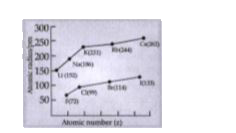
Which of the following correctly represents the decreasing order of metallic character of Alkali metals plotted in the graph ?
View SolutionElectropositivity is the non-metallic character of an element.
View Solution
Knowledge Check
Metallic Character
The ability of an atom to donate electrons and form positive ion (cation) is known as electropositivity or metallic character. Down the group, metallic character increases due to increase in atomic size and across the period, from left to right electropositivity decreases due to decrease in atomic size.
Non-Metallic Character
The ability of an atom to accept electrons to form a negative ion (anion) is called non-metallic character or electronegativity. The elements having high electro-negativity have a higher tendency to gain electrons and form anion. Down the group, electronegativity decreases due to increase in atomic size and across the period, from left to right electronegativity increases due to decrease in atomic size
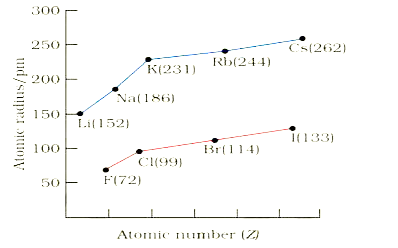
Which of the following has highest electronegativity?AFBClCBrDIMetallic Character
The ability of an atom to donate electrons and form positive ion (cation) is known as electropositivity or metallic character. Down the group, metallic character increases due to increase in atomic size and across the period, from left to right electropositivity decreases due to decrease in atomic size.
Non-Metallic Character
The ability of an atom to accept electrons to form a negative ion (anion) is called non-metallic character or electronegativity. The elements having high electro-negativity have a higher tendency to gain electrons and form anion.Down the group, electronegativity decreases due to increase in atomic size and across the period, from left to right electronegativity increases due to decrease in atomic size
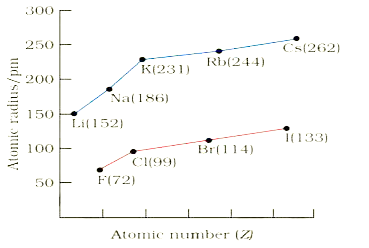
Hydrogen is placed along with Alkali metals in the modern periodic table though it shows non-metallic characterAas Hydrogen has one electron & readily loses electron to form negative ionBas Hydrogen can easily lose one electron like alkali metals to form positive ionCas Hydrogen can gain one electron easily like Halogens to form negative ionDas Hydrogen shows the properties of non-metalsMetallic Character
The ability of an atom to donate electrons and form positive ion (cation) is known as electropositivity or metallic character. Down the group, metallic character increases due to increase in atomic size and across the period, from left to right electropositivity decreases due to decrease in atomic size.
Non-Metallic Character
The ability of an atom to accept electrons to form a negative ion (anion) is called non-metallic character or electronegativity. The elements having high electro-negativity have a higher tendency to gain electrons and form anion. Down the group, electronegativity decreases due to increase in atomic size and across the period, from left to right electronegativity increases due to decrease in atomic size
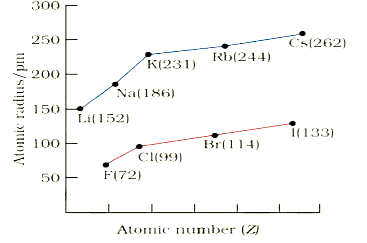
Which of the following reason correctly justifies that “Fluorine (72pm) has smaller atomic radius than Lithium (152pm)”?AF and Li are in the same group. Atomic size increases down the groupBF and Li are in the same period. Atomic size increases across the period due to increase in number of shellsCF and Li are in the same group. Atomic size decreases down the groupDF and Li are in the same period and across the period atomic size/radius decreases from left to right.
Electro positivity : Metallic character : : .. .. , .... ... : Non-metallic character.
View SolutionAs we move across a period from left to right, metallic character ______ (decreases/ increases)
View SolutionConsidering the atomic number & position in the periodic table, arrange the following elements in the increasing order of metallic character: Si,Be,Mg,Na,P.
View SolutionMetallic Character
The ability of an atom to donate electrons and form positive ion (cation) is known as electropositivity or metallic character. Down the group, metallic character increases due to increase in atomic size and across the period, from left to right electropositivity decreases due to decrease in atomic size.
Non-Metallic Character
The ability of an atom to accept electrons to form a negative ion (anion) is called non-metallic character or electronegativity. The elements having high electro-negativity have a higher tendency to gain electrons and form anion.Down the group, electronegativity decreases due to increase in atomic size andacross the period, from left to right electronegativity increases due to decreasein atomic size
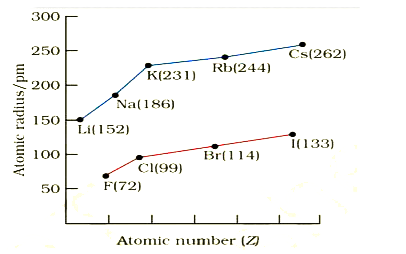
Identify the reason for the gradual change in electronegativity in halogensdown the group.
View SolutionFrom Be to Ba electropositive or metallic character
View Solution
